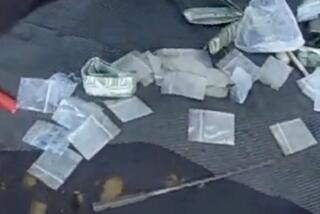Giving street vendors the business
Joey Bebolla spread his wares on the sidewalk of Beach Street in Watts: some plastic aquarium plants, a few used tape players, an ancient BlackBerry. A woman walking by picked up an old toy cash register, which Bebolla had cleaned up after finding it in the trash. “Give me $2,” he said. “Fine, give me $1.”
The woman passed on the quick discount, and put the item down. “Selling used to be embarrassing, at first,” Bebolla said. “But I had to do it to survive, and now I’m used it.”
Hawking fruit at freeway offramps or old clothing on driveways and lawns is a Los Angeles tradition.
But a proliferation of unlicensed street vending, and people illegally selling used items out of their homes or at informal open-air markets like the one on Beach Street, are becoming neighborhood nuisances — and worse, according to some officials.
PHOTOS: Unlicensed street vending
“Both activities are a blight on communities,” according to a motion scheduled to be considered by the L.A. County Board of Supervisors on Tuesday that could crack down on the activities.
Board member Mark Ridley-Thomas, who represents the Watts area and wrote the motion, says illegal vending is hurting local businesses and driving down sales tax collections. He’s calling for county planners and law enforcement officials to explore strengthening codes to control the unlicensed vendors and resellers, some of whom set up more or less continuous operations, he says.
The intent is to help out legitimate businesses and concerned residents, not to stop homeowners from having occasional weekend yard sales, said Nedra Jenkins, Ridley-Thomas’ chief deputy.
“What’s happening is people are setting up on the sidewalk in front of legal businesses, and people end up shopping there instead of going to the legal business,” Jenkins said. “There has to be a balance.”
Jenkins didn’t know whether complaints have increased, and the county’s zoning enforcement office was unable last week to provide a count of calls about illegal vending.
But some residents say that the problem has grown.
Craig McClendon has lived in the 900 block of Beach Street since the 1970s, just north of Bebolla’s makeshift stall. Although people have always sold goods in the area, “it’s never been this bad,” the former truck driver said.
On Saturday, a square-block area near Beach and 92nd streets was filled with vendors selling a mix of items including CDs, ice cream and small scooters.
On weekends, shoppers take up all the street parking, McClendon said. Unemployed himself, he said he understands that people are struggling to make ends meet in a tough economy. But “this is a residential neighborhood,” he added.
The street sellers said they don’t cause serious problems and try not to play loud music or leave trash. “People are usually really respectful,” Bebolla said.
They also say they provide a lower-cost shopping alternative to customers.
Jesus Navarro, who sells electronics, clothing and shoes, said he has heart disease and cannot hold a regular job. Cellphone chargers are his most popular item, he said. “I have them for $2. In a store, they’re $10,” he said, repairing a pair of Rollerblades he hoped to sell.
Navarro said he either finds his wares or gets them from family and friends.
David Delgado, who stopped and tried on a Yankees jersey and several baseball caps, said he comes to the area in search of good deals. “It’s much cheaper here than in the mall,” he said.
Some vendors say sheriff’s deputies occasionally make them move, but they are generally left alone, probably because unregulated sales are so common. “Look at how many people are selling around here,” said Jesus Rodriguez, a customer taking in the Beach Street scene.
Tafarai Bayne, community affairs manager for TRUST South LA, a nonprofit group, warned that more regulation, especially increased visits from deputies, could hurt an already delicate relationship between the neighborhood and law enforcement.
“It could create more tension in a situation that already has a lot of it,” he said.
At the corner of Century Boulevard and Compton Avenue, Maria Vasquez had hung some used clothing on a rack, arranged sundresses on hangers on a nearby tree and was using the base of a pedestrian crossing sign to display robes.
Vasquez, who cleans homes during the week, said she used to pay $20 a day for a small space at a flea market, even if she didn’t sell anything.
“It’s much nicer on this corner. There’s more shade,” she said. “And it’s free.”
jason.song@latimes.com
More to Read
Sign up for Essential California
The most important California stories and recommendations in your inbox every morning.
You may occasionally receive promotional content from the Los Angeles Times.











